Although I am not a developer, I build my websites on my own for a few reasons. I love working at my own pace, I enjoy the freedom of making changes whenever I want, and most importantly, I DON’T want to spend hundreds of dollars every time I need to update my website.
Since 2008, I’ve been on quite a journey with website builders. Over the years, I created several websites, including blogs, small business websites, and eCommerce sites that helped me generate passive income.
Through trial and error (and yes, some frustrating moments), I’ve tested practically every major website builder out there.
In this guide, I’ll share my honest insights about the best website builders available today.
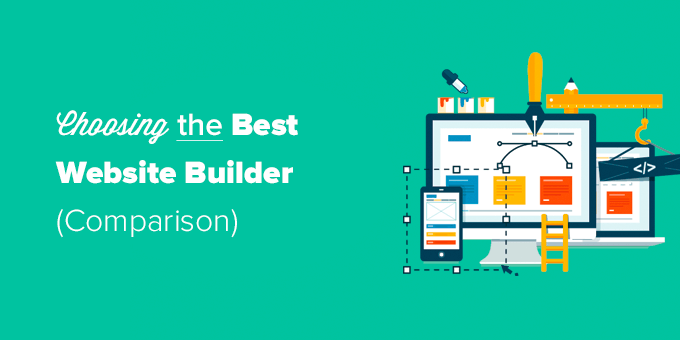
Overview: Best Website Builders
In a hurry? Check out this quick comparison of my top picks for the best website builders:
| # | Website Builder | Best For | Pricing |
| 🥇 | WordPress | Overall best website builder | Starts at $1.99/mo |
| 🥈 | Wix | Building a free website | Starts at $17/mo + Free |
| 🥉 | Web.com | Easily creating a simple site | Starts at $4.99/mo |
| 4 | HubSpot Website Builder | Built-in marketing automation | Starts at $15/mo + Free |
| 5 | WooCommerce | Creating an online store | Starts at $2.99/mo |
Criteria for My Best Website Builder Review
Over the last 16 years, I’ve tested nearly every website builder out there. Trust me, I’ve made all the rookie mistakes so you don’t have to!
When I review website builders, I focus on five crucial elements that I wish someone had told me about when I first started:
- Ease of Use – Nothing is worse than getting stuck and trying to figure out why your header image won’t align properly. When choosing a platform, I always ask these questions: can you easily drag and drop elements and make changes without breaking your site?
- True Cost (Not Just Pricing) – I learned this the hard way: the true cost of building a site isn’t equivalent to the website builder’s pricing plan. I once built an entire website only to discover I needed to pay extra for basic features like adding a contact form or removing ads. Now, I dig deep into what’s actually included in a pricing plan to avoid nasty platform fees.
- Unique Designs – Nobody wants their website to look like a cookie-cutter template from a decade ago. I always check whether it’s possible to customize designs without getting trapped in rigid layouts.
- Real Human Support – We’ve all faced that moment when something goes wrong and the only support available is a chatbot sending irrelevant help articles. I test each builder’s support team extensively.
- Future-Proofing Your Site – What happens if you outgrow your current platform? Can you take your content with you? I’ve seen too many people trapped in platforms that own their data or make it impossible to move without starting from scratch. I make sure you won’t face this nightmare.
You can also take a look at our editorial process to see how I test and review software.
Let’s take a look at the best website builder software to start building your website without hiring a developer or coding HTML from scratch.
1. WordPress
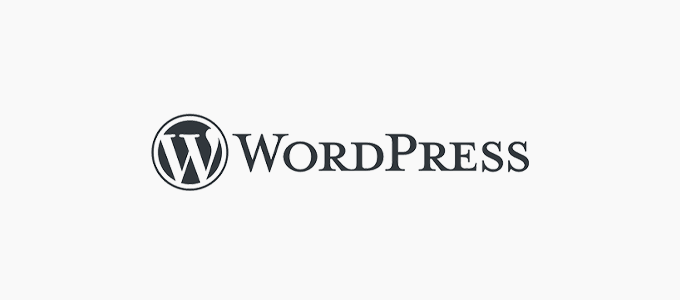
WordPress.org (also known as self-hosted WordPress) is the world’s most popular website-building platform. I migrated my first website to WordPress in 2010. Since then, WordPress is my go-to platform for building sites.
In fact, 43.5% of all websites on the internet are powered by WordPress. So, I would say that lots of people probably agree with me.
If you’re diving deep into WordPress research, we’ve documented my extensive experience in this detailed WordPress review. It covers everything we’ve learned from building countless websites over the years.
Here’s something crucial to understand: WordPress.com and WordPress.org are different platforms. Think of WordPress.org as owning your own home – you have complete control but need to set up utilities (hosting). WordPress.com is more like renting an apartment – easier to move in, but with some restrictions. For a detailed breakdown, check out my comparison between WordPress.org and WordPress.com.
The beauty of WordPress.org lies in its complete freedom – you own everything about your website. There’s no middleman controlling your content or limiting your choices. This level of control and flexibility is why major organizations like WhiteHouse.gov, CNN, The New York Times, and Microsoft trust WordPress with their online presence.
Pros:
WordPress became my go-to platform because it lets you build any type of website you can dream of. From an online store selling handmade jewelry to community forums for plant enthusiasts, or even a membership website for your online courses – WordPress handles it all seamlessly.
Here is what made me faill in love with WordPress: you don’t need to settle for a boring, cookie-cutter design. You’ll find thousands of beautiful, ready-to-use themes (think of them as your website’s outfit), and each one can be customized to match your unique vision.
Remember those frustrating times when you couldn’t make simple changes to your website? With WordPress’s content editor, you’re in complete control. Want to update your header at midnight? Add a new section to your homepage? Change your footer design? You can do it all yourself, no coding required!
The real magic happens with WordPress plugins – over 60,000 free add-ons that enhance your website’s capabilities. These powerful tools let you add essential features like contact forms, Google Analytics, photo galleries, social media integration, and much more.
These plugins serve as practical tools that streamline your daily operations by connecting seamlessly with your favorite business applications, saving you countless hours of manual work.
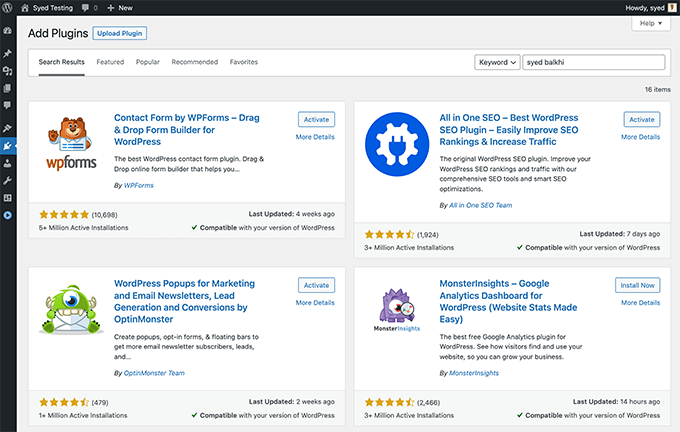
For international reach, WordPress offers support in over 75 languages, making it simple to create multilingual websites. This feature alone opens your content to a global audience.
WordPress truly shines with its built-in SEO capabilities. Combined with powerful SEO tools like
Cons:
Like any powerful tool, WordPress does require some initial learning and ongoing maintenance. However, the learning process is much easier than you might think, especially with the abundance of user-friendly tutorials and guides available online.
The maintenance aspect of WordPress is straightforward once you understand the basics. You’ll need to update WordPress core software and plugins occasionally.
Pricing:
While WordPress is a free website builder, you will need a domain name and web hosting to get your website live, which typically costs $14.99/year and $7.99 per month, respectively.
Fortunately, we have worked out a special deal for WPBeginner readers. You can start a website for only $1.99 per month with Bluehost, an official WordPress-recommended hosting provider. They are offering my readers up to 83% off on web hosting that comes with a free SSL certificate, free domain name, great uptime, and 24/7 phone support.
With this special pricing, WordPress is one of the cheapest website builders on this list for small businesses.
For more details, see my guide on how to make a website with step-by-step instructions (including a video tutorial).
Note: WordPress works with all popular web hosting services, and it’s actually recommended by many other companies, including GoDaddy, SiteGround, DreamHost, Hostinger, and more.
Ready to get started but don’t have a business name idea yet? Use my smart AI-powered business name generator tool to come up with your brand name idea.
2. Wix

Wix.com is a popular cloud-based website builder software favorite among smaller business owners who need a simple site.
In my experience, what makes Wix stand out is their powerful AI features and easy drag & drop design customizer for websites. They also have a lot of templates too.
Wix lets you start building your website for free without entering your credit card information although the eCommerce plans can get quite costly.
Pros
Wix website creator is a fully hosted platform, so you will not have to pay for separate hosting. Since it’s an all-in-one package, you won’t need to juggle multiple services – hosting, design, and security are all bundled together. This saved me countless hours of technical setup that I could instead spend on creating content.
The template collection is truly impressive. Although it lets you customize the site with drag and drop, customizability is limited compared to WordPress.

From my experience, what I believe truly sets Wix apart is their AI design assistant (Wix ADI). It’s like having a professional web designer who understands your needs and creates a custom website based on your preferences.
The Wix App Market is another feature I love. These tools can transform your basic website into a powerful business platform, although the app platform is not as comprehensive as WordPress.
While Wix offers a free plan, I recommend upgrading to a premium plan if you’re serious about your online presence. This gives you access to a professional domain name and removes Wix branding from your site.
Security is also covered – every Wix plan includes SSL certification, though you’ll need to activate it. This ensures your visitors’ data stays protected, which is crucial for building trust online.
Cons
While Wix is powerful, understanding its limitations will help you make an informed decision.
The free and Connect Domain plans come with a catch – your site will display Wix-branded advertisements. These ads can affect your professional image, which is why I always recommend upgrading to their premium plans for a more professional appearance.
One significant limitation I’ve encountered is platform lock-in. If your business outgrows Wix and you need to migrate your website to another platform, the process can be challenging. Unlike other platforms, Wix doesn’t offer a straightforward export option for your content.
As I use it, I’ve noticed several other aspects worth considering:
- The editor’s flexibility can sometimes lead to inconsistent designs across different pages if you’re not careful with your layout choices
- Loading speeds can be slower compared to other platforms, especially on mobile devices with complex designs
- Once you choose a template, typically, you can’t switch to another without rebuilding your site from scratch
- The blog features are basic compared to dedicated blogging platforms, which might limit content marketing efforts
- Advanced customization requires working within Wix’s ecosystem – you can’t add custom code everywhere you might want to
These limitations don’t make Wix a bad choice – they simply mean you need to align your needs with what the platform can realistically offer. For many small businesses and personal websites, these trade-offs are perfectly acceptable for the convenience and ease of use Wix provides.
Pricing
Wix premium plans start at $17 per month and will get you a free domain name. The basic eCommerce plan for online stores starts at $29 per month.
If you are interested in how it stacks up against WordPress, then see my comparison of Wix vs. WordPress.
3. Web.com

Web.com is one of the original and most popular website builders for small businesses. They offer easy-to-use website-building tools at a very affordable price, so anyone can build a website without having to know how to code.
What truly sets Web.com apart is their human touch. Unlike many modern platforms where you’re left to figure things out on your own, their support team feels more like having a tech-savvy friend on speed dial.
During my testing, I was particularly impressed by their done-for-you service.
Plus, their template collection strikes a nice balance between variety and simplicity – you’ll find designs that look professional without feeling overwhelming.
Pros
Web.com offers a powerful drag-and-drop web builder that’s beginner-friendly and suitable for non-techy business owners.
Unlike some builders that offer limited options, Web.com provides thousands of templates that serve as perfect starting points. Each template can be customized to match your brand’s personality with just a few clicks.
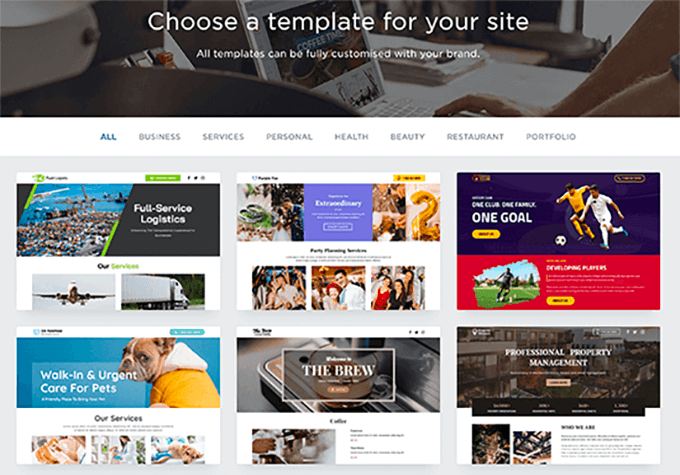
The platform comes packed with essential features that every modern website needs. You can easily create stunning photo galleries, embed videos, showcase customer testimonials, add contact forms, and integrate maps – all without touching any code.
One feature I particularly appreciate is the flexibility to customize each page individually while maintaining unlimited page creation. Their mobile-friendly approach ensures your site looks great on all devices, and you can fine-tune the design specifically for desktop, tablet, and mobile views.
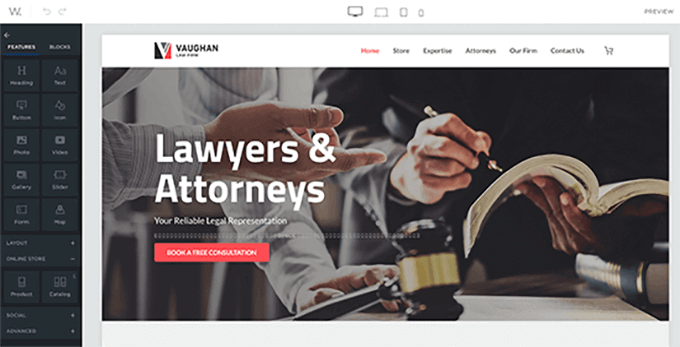
If you’re into online selling, you can list up to 50 products, handle secure payments, manage orders, and run promotions – perfect for small to medium-sized online stores.
The value proposition becomes even stronger when you consider what’s included in every plan: a free domain name, business email, automatic backups, security features, SEO tools, and analytics. It’s like getting a complete business toolkit along with your website.
Their support system stands out – you get unlimited access to real human experts via phone and chat. This personal touch can be invaluable when you need immediate assistance.
What truly sets them apart is their custom web design service. If you prefer to have professionals handle everything, their team can build your entire website at a surprisingly reasonable cost – perfect for busy entrepreneurs who value their time.
Cons
While Web.com offers all the tools you need to build a small business website, it lacks some of the powerful features that you may want as your business grows.
For example, the blogging functionality on Web.com is very limited and nowhere close to the power of what you get with WordPress.
Their eCommerce plan restricts you to only 50 products, which is more than enough for most small businesses. However, if you’re looking to create a larger online store, then you may want to look at other website builders on my list, such as WooCommerce or Shopify.
Lastly, since Web.com is a proprietary website builder, you cannot easily switch to a different platform if you want to do so in the future.
Pricing
Web.com pricing starts at $4.99 per month for their website starter plan, which comes with their drag-and-drop website builder, hundreds of beautiful templates, thousands of stock images, and a free domain.
Their Website + Marketing plan starts at $7.99 per month, and it includes additional SEO features to help you rank higher. Lastly, their Online Store plan starts at $9.99 per month, which includes eCommerce tools like the ability to accept credit cards with a secure shopping cart, sell up to 50 products, track & manage your orders, and more.
Web.com site builder allows you to create a business website at a very affordable price.
4. HubSpot Website Builder

HubSpot Website Builder is a powerful content management platform that’s built for marketers and small business owners. It combines the power of their drag-and-drop website builder, marketing automation tools, and CRM so you can deliver a personalized digital experience to your users.
Pros
HubSpot is known for being one of the world’s leading marketing automation and CRM platforms in the world. After listening to small business concerns, they have decided to create an all-in-one website builder that helps you create a website in minutes (without hiring a developer).
You can use their conversion-optimized website templates to quickly build a website that delivers results.
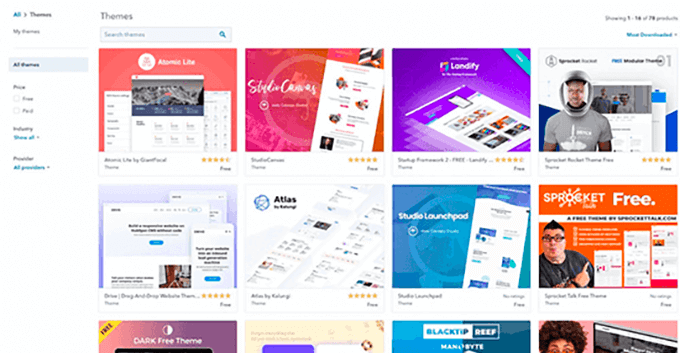
Alternatively, you can use their easy drag-and-drop editor to create a custom website design within minutes.
The best thing about HubSpot’s website builder is that it lets you do adaptive testing, so you can choose up to five variations of a page, and HubSpot will monitor & serve the best-performing option.
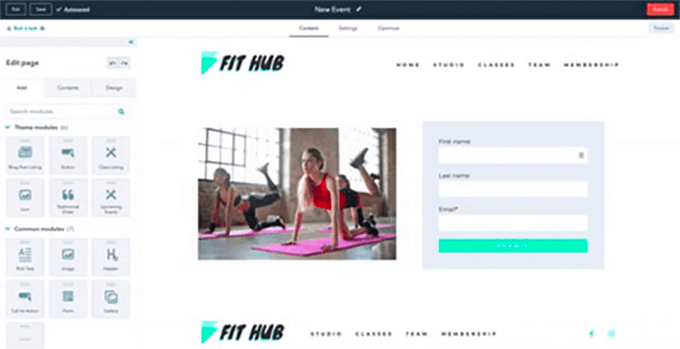
HubSpot website builder seamlessly integrates with their CRM platform, so you can leverage the customer data to create a completely personalized digital experience for each website visitor.
It comes with many other powerful features, including SEO tools, powerful analytics, blogging features, live chat software, email marketing tools, multi-language content support, and more.
Considering the features of their integrated marketing platform, HubSpot is one of the best professional website builders on this list for marketers and small businesses.
Cons
While HubSpot allows marketers to build personalized digital experiences, the platform is best suited for landing pages and simple business websites. For online stores and advanced business websites, you’re better served with WordPress.
The good thing is that HubSpot recognizes this as well, and this is why they have a free WordPress plugin that allows you to seamlessly integrate with WordPress to offer the best of both worlds.
HubSpot is a very powerful platform that comes with a lot of features. This can be intimidating for small business owners who are just getting started. As long as you are committed, their account executives will work with you to ensure that your business succeeds online.
Pricing:
HubSpot offers a powerful free website builder that not only allows you to create a website but also gives you a suite of marketing automation tools like CRM, email marketing, live chat, and more.
You can get started for free, and as your business grows, you can choose from the package that best suits your needs.
Their paid plan prices start from $15 per month for the Content Hub Starter plan, which gives you all their business tools, including CMS (website builder), marketing hub, sales tools, and business operation tools, with increased limits.
All plans come with 24/7 live chat and phone support; their support team is helpful.
HubSpot is a great choice for small businesses who are looking for an integrated website builder platform that has all the small business tools they need.
5. WooCommerce
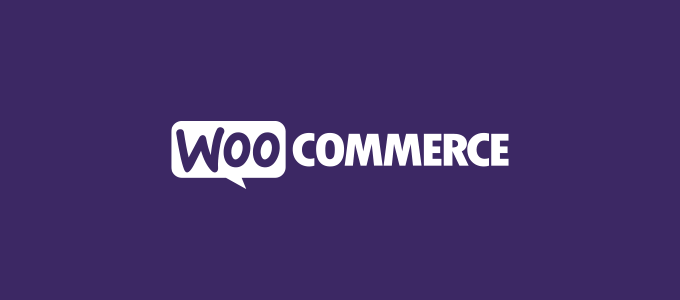
WooCommerce is the most popular eCommerce website builder on the planet to start an online store. It’s an open-source eCommerce software built on top of WordPress.
According to my research, 9.2% of all websites are using WooCommerce as their eCommerce website builder, making it twice as large as Shopify.
Pros
WooCommerce is the best website builder for eCommerce sites because it gives you complete control over your website.
It comes with every feature you could possibly imagine for running a successful online store.
You can accept online payments using WooCommerce Payments or integrate with over 83 other payment options, including Stripe, PayPal, Square, Authorize.net, AmazonPay, AfterPay, Klarna, Apple Pay, Google Pay, and more.
Unlike Shopify, WooCommerce doesn’t charge extra transaction fees if you choose to use other payment solutions, which is great for my international clients who don’t want to be limited to Stripe only.
They also offer dozens of apps / extensions to help you with shipping, delivery, fulfillment, sales tax management, inventory management, and just about every aspect of store management.
You can build custom sales funnels and product landing pages using SeedProd, create an affiliate program using AffiliateWP, show real-time social proof with TrustPulse, offer free shipping or run BOGO deals using Advanced Coupons, set special wholesale prices with Wholesale Suite, add order bumps and upsells with FunnelKit (formerly WooFunnels), and do basically everything else you can imagine.
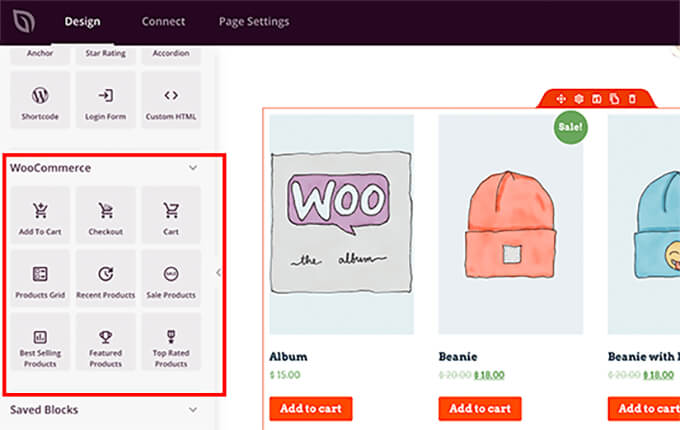
WooCommerce seamlessly integrates with all popular email marketing services, analytics platforms, live chat software, helpdesk software, and conversion optimization tools.
You can reduce cart abandonment and boost sales conversions by adding gamification from the OptinMonster plugin for WooCommerce.
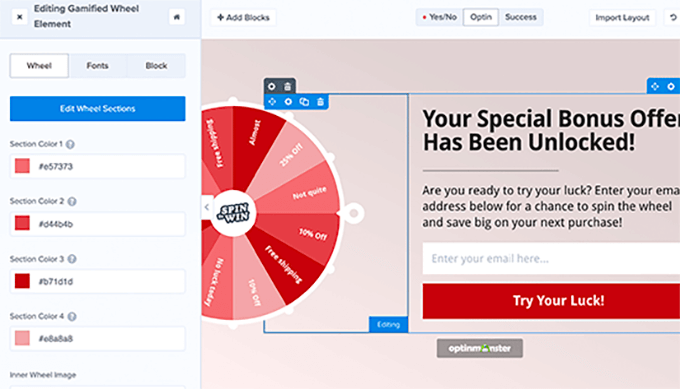
Aside from that, WooCommerce is extremely SEO friendly, and you can further improve your eCommerce SEO by using the AIOSEO plugin.
The freedom and flexibility WooCommerce offers simply cannot be put into words. For more details, see my full list of the best WooCommerce plugins and best WooCommerce themes.
For all the reasons above, I rate WooCommerce as the best website builder for eCommerce.
Cons
Just like WordPress, WooCommerce is a self-hosted eCommerce platform, which means you will need to familiarize yourself with a new system.
You will be responsible for keeping WooCommerce updated, creating website backups, and performing routine website maintenance tasks. That said, most of these tasks can be automated by WooCommerce hosting providers like SiteGround, Bluehost, WP Engine, and others.
Pricing
WooCommerce is a free eCommerce website builder, but you will need a domain name and web hosting to get your online store live.
This cost will vary based on your website traffic and popularity.
You can start as low as $2.99 per month with the SiteGround Startup Plan, which comes with WooCommerce pre-installed, a free SSL certificate, daily website backups, free CDN, auto-updates, and enhanced security.
→ Click here to Claim this Exclusive SiteGround offer ←
Alternatively, you can also use the Bluehost Premium WooCommerce plan, which costs $7.45 per month, but it comes with several premium WooCommerce extensions such as subscriptions, online booking & appointments, and other premium features (valued at over $1000 if you purchased separately).
Really high-traffic WooCommerce site owners often end up using WP Engine for managed WooCommerce hosting, and their pricing starts at $20 per month.
For more details on this, see my complete breakdown of how much eCommerce websites really cost.
6. Hostinger Website Builder (formerly Zyro)

Hostinger Website Builder, formerly Zyro, is a powerful and affordable website builder for beginners. What I really like about them is that they offer an easy-to-use drag & drop website builder solution with free hosting and up to 78% off premium plans using the WPBeginner Hostinger coupon code.
This makes Hostinger an excellent choice for those looking for a cheap website builder to start their website.
Pros
The Hostinger Website Builder allows you to create a website without design or coding skills. Their easy-to-use and powerful design tools make it easy for anyone to build visually stunning websites.
During my testing, I was really impressed with their AI-powered site builder. I liked the way it automatically set up a professional website based on my answers to a few simple questions.
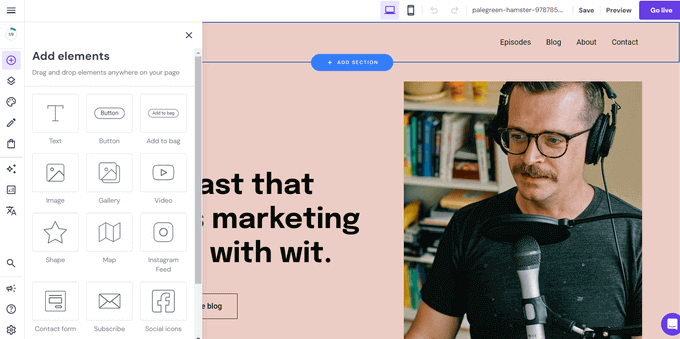
It comes with a logo maker, useful AI writing tools, and 150+ pre-made website templates that you can start with.
You also have access to over 1 million high-quality images for free.
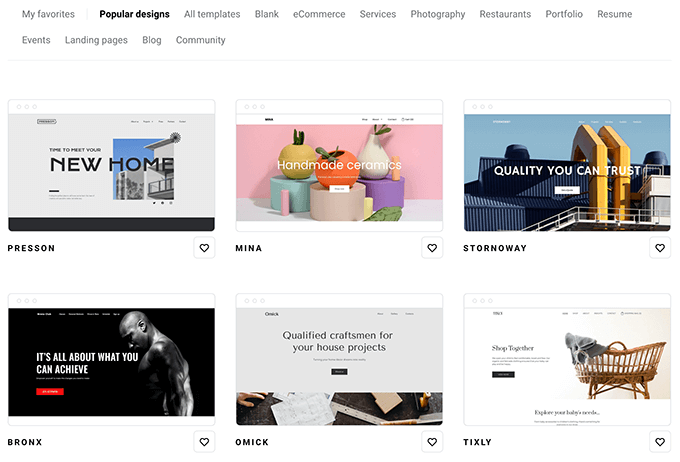
Another thing I liked is its affordable pricing. If you are an artist or a small business on a tight budget, then Hostinger is your best bet. Their website builder pricing starts at $2.99 per month.
But don’t let the low pricing make you think this isn’t a powerful website builder platform. They offer great uptime and reliability.
With each plan, you get new powerful features. For example, on the Premium plan, you get marketing integrations like Google Analytics, Facebook retargeting, visitor remarketing, etc.
They also have eCommerce plans that allow you to add unlimited products, accept online payments, offer discount coupons, order management, inventory management, and even connect your store with Amazon, Instagram, and Shopify.
Cons
The website builder doesn’t make it easy to switch templates once you choose one.
Also, since Hostinger is not open source, it doesn’t have the third-party integrations and add-ons that WordPress offers. And while Hostinger offers blogging features, it’s not a true blog platform, so it lacks features like the ability to schedule blog posts, etc.
However, Hostinger now offers a WordPress-focused AI website builder that lets you launch a fully functional site with content and images in seconds, providing the power of WordPress without the traditional setup hassle.
There’s also no free plan, but they offer a 30-day money-back guarantee.
Pricing
Hostinger pricing starts at $2.99 per month. If you want more advanced features, you can upgrade to the Business Website Builder plan, which starts at $3.99 per month.
You can get a discount on any of these plans using my Hostinger coupon code: wpbeginner.
7. BigCommerce

BigCommerce is a popular eCommerce website builder that allows you to easily create an online store that scales. It comes with all the essential features built-in, so you can keep your overhead low and margins high.
Pros
BigCommerce is a fully hosted eCommerce solution, so you don’t have to worry about website speed, security, or updates. They handle the server and technical side for you so you can focus on growing your business.
Unlike other hosted eCommerce solutions, BigCommerce has native integration with WordPress, which allows you to leverage the flexibility of WordPress while taking advantage of the headless eCommerce power of BigCommerce. Simply put, if you choose this option, your website will be fast and secure no matter how much traffic you get.
BigCommerce integrates with all popular payment gateways, including Stripe (credit cards and ACH), PayPal, Apple Pay, Square, Amazon Pay, Visa Checkout, Chase Pay, Ayden, and more. Unlike Shopify, BigCommerce doesn’t charge a transaction fee for you to use these payment gateways.
You can start with one of their many pre-made website templates and customize it to match your needs using their easy drag-and-drop website builder.
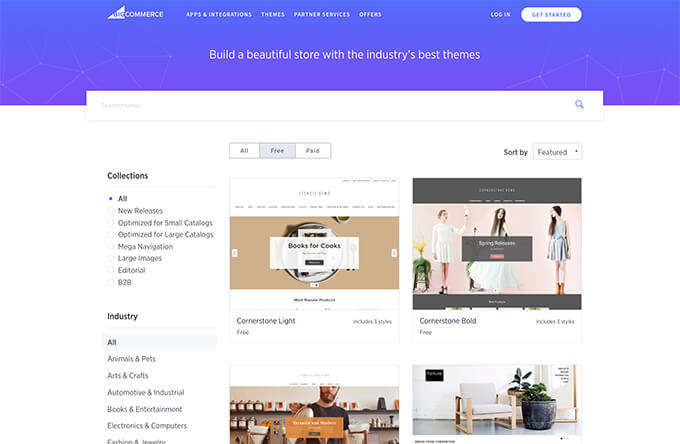
BigCommerce has many built-in features to handle conversion rate optimization, such as cart abandonment, improved product search, product reviews, coupons, and more. You can connect with third-party applications from their app store for additional features.
Pro Tip: You can use the OptinMonster app for BigCommerce to add personalized messages and boost your eCommerce conversion rates.
The best part is their dashboard, which lets you see the metrics to help you confidently grow your business.
Cons
If you are just starting out, you will find BigCommerce pricing a bit higher than that of other website builders.
Since it’s a proprietary platform, migrating away from BigCommerce will be difficult.
Pricing
BigCommerce comes with a 15-day free trial for all plans. Their Standard plan starts at $29 per month, with all the essential features you need. You can upgrade to the Plus plan, which costs $79 per month for additional conversion optimization features. Their Pro plan costs $299 monthly and has all the advanced features you may need.
The best part about BigCommerce when compared to Shopify and other third-party eCommerce platforms, is that they have a seamless integration with WordPress, which can be a huge plus if you want to combine the flexibility of WordPress with the power of BigCommerce.
This is one of the reasons why I have BigCommerce listed as high in my best eCommerce website builder list.
8. Shopify

Shopify is a very popular eCommerce website builder designed specifically for online stores and eCommerce websites. It powers millions of online stores across 175 different countries. Over 400 billion dollars worth of products have been sold on Shopify’s platform.
According to expert research here at WPBeginner, 4.2% of all websites on the internet are using Shopify as their eCommerce website builder.
In my experience, Shopify is great for larger eCommerce stores because they have all the tools and scalability that you need to ensure your online store never crashes. But if you’re a small business owner, then Shopify can get quite costly because their extensions are generally far more expensive than WooCommerce ones.
Pros
Shopify is an all-in-one fully hosted eCommerce software, this means you don’t have to worry about managing software, installing updates, or keeping backups. Shopify does all that for you.
It offers an integrated payment solution called Shopify Payments, which lets you accept credit cards. You can also add third-party payment gateways to accept payments.
As an eCommerce website builder, Shopify comes with full inventory management, unlimited products, powerful stats, and easy marketing solutions, all neatly wrapped under one roof. They have hundreds of designs to choose from, and you will never need to add code.
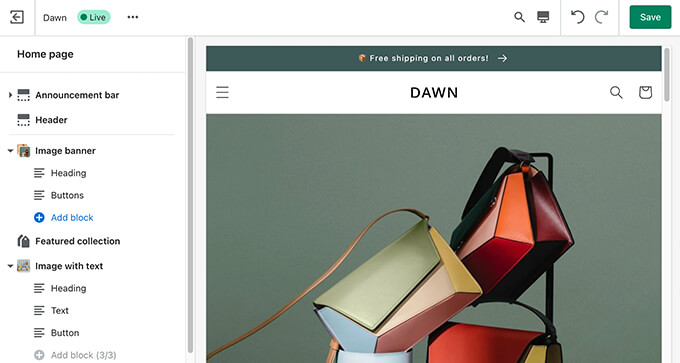
With its intuitive drag-and-drop interface, Shopify makes it super-easy to create a full-fledged online store.
They also offer in-store POS, which allows you to sell products at your location while accepting all credit cards and taking advantage of Shopify’s inventory, shipping, marketing, and stats management tools.
Cons
Shopify forces you to use its Shopify Payment platform. If you want to use your own payment processing solution, they charge an additional 2% transaction fee, which is really high.
If you are just starting out, then you may find Shopify’s pricing a bit higher than some other website builders on this list. For more details, see my Shopify vs. WooCommerce comparison.
If you ever want to move your website away from Shopify, you will find it quite difficult to do so.
Update: Due to popular demand, I have created a step-by-step tutorial on how to switch from Shopify to WooCommerce. My team and I built a free migration tool that does the work for you.
Pricing
Shopify’s Basic plan will cost you $29 per month. You can upgrade it to the Shopify plan for $79 per month or Advanced Shopify for $299 monthly.
If you want a hassle-free eCommerce website builder, then Shopify may be the perfect option for you.
9. WordPress.com

WordPress.com is a blogging platform and website hosting service run by Automattic. It is created by Matt Mullenweg, the co-founder of WordPress open-source software, hence the name WordPress.com.
To learn more, see my article on how are WordPress.com and WordPress.org related.
WordPress.com is not the same as the self-hosted WordPress.org that I mentioned as my #1 website builder. Instead, this is a customized hosting solution primarily focused on blogging. Please see my comparison of WordPress.com vs. WordPress.org for more details.
In the recent years, WordPress.com has really been stepping up their WordPress hosting game. They’re now offering Business and eCommerce plans without restrictions which gives you the flexibility of WordPress.org with the power of their infrastructure.
It’s a nice combination, and I have several clients now using WordPress.com because they don’t want to deal with the headaches of updates, backups, and website monitoring.
Pros
WordPress.com is a website hosting service built on top of the same WordPress software but with a totally custom user experience. You don’t have to worry about the software and backups, as WordPress.com takes care of it.
Their free and paid plans have a different set of features. All plans allow users to choose from hundreds of free and paid WordPress themes. You can then use the built-in customizer to add your site title, use widgets, add navigation menus, and so on.
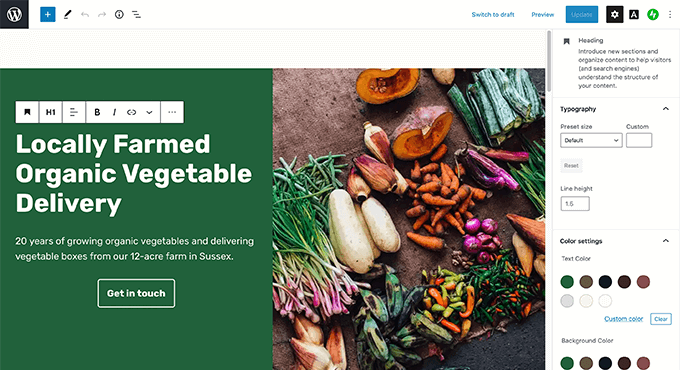
It doesn’t offer the same drag-and-drop functionality as other website builders. However, you can easily customize designs to a certain extent.
It does come with powerful editing tools that bloggers find really helpful.
Cons
You cannot install custom plugins or themes unless you upgrade to their business or eCommerce plan.
Premium and lower plans do not have eCommerce features or third-party ad network support. With the business plan, you can use WooCommerce, install WordPress plugins, and third-party ad networks. However, you will still have to follow WordPress.com’s terms and conditions.
WordPress.com charges a commission for the payment feature. On the free account, this commission is 8% and is separate from payment processing charges. To get rid of the commission, you will need at least the eCommerce plan, which starts at $45 monthly.
Pricing
The WordPress.com free plan is extremely limited. Their Starter plan costs $4 per month, billed annually, and includes a custom domain. The Premium plan costs $8 per month, billed annually, allowing you to monetize your site and advance design customization.
But to really build professional websites, you’ll need either their Business plan ($10 per month) or their eCommerce plan ($22.50 per month), which are far more expensive than self-hosted WordPress.
10. Squarespace

Squarespace is a popular professional website builder known for its great designs and ease of use. According to W3Techs, roughly 1.8% of all websites are built with Squarespace.
Now, I really like Squarespace for building photography websites because their website builder templates and design elements are specifically catered towards creatives. I personally don’t use Squarespace for eCommerce or more complex websites because I feel the platform is a bit limited.
Pros
Squarespace comes with enterprise-grade infrastructure for hosting your website. This secure and robust platform allows you to focus on growing your business without worrying about hosting.
Squarespace includes tons of website designs to get started. All of these designs are completely ready for all types of content. They are fully editable, and Squarespace even allows you to use multiple templates for the same website at once.

Adding content to your website is very easy on Squarespace. Just point anywhere on your website and start typing.
You can easily drag and drop items on pages to create your own layouts in minutes.

Squarespace also has an eCommerce plan which allows you to add an online store to your website. It offers a friendly interface to manage your products, inventory, orders, coupon discounts, and more.
Cons
Squarespace offers limited integrations with third-party services, which can be a hurdle in growing your business.
Their eCommerce plans only allow Stripe, Apple Pay, and PayPal for payment processing. You cannot add additional payment gateways.
Pricing
Squarespace websites start from $16 per month and $23 per month. Their online stores start from $28 and $52 per month.
Squarespace is a beautifully designed platform that offers very easy-to-use features. It can be perfect if you just want to quickly build a website.
If you are wondering how it stacks up against WordPress, look at my comparison of Squarespace vs. WordPress.
11. Weebly

Weebly is an easy website builder software with tons of great designs and functionality. It includes a beautifully crafted page builder that allows you to edit your website without learning any coding skills.
The popular payment platform Square acquired Weebly to offer a more integrated website builder solution for local businesses.
However in my experience, I feel that Weebly has not kept up to pace with other website builders in the list.
Pros
Weebly is a fully hosted platform, so you don’t need to install and manage any software. They take care of hosting your website and managing all the software that runs on the backend.
It comes with dozens of website designs to use as a starting point for your website. These gorgeous designs are fully editable using Weebly’s live page editor.
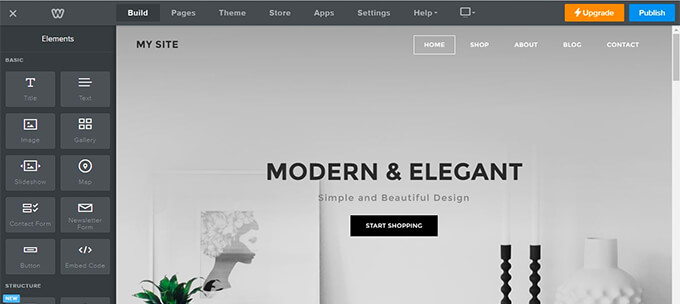
Weebly also comes with built-in support for eCommerce. This allows you to easily create an online store and start selling.
Each Weebly site has built-in features for contact forms, photo galleries, sliders, and more. This allows you to easily add features to your website without any complicated setup process.
Given the ease of use and great features, Weebly is consistently rated among the best DIY website builders for beginners.
Cons
Weebly.com offers a fully hosted platform, so you are locked into the features they offer. You cannot hire a developer or designer to add new functionality or features to your website.
Weebly will show Square ads on your site on both Free and Personal plans. You have to upgrade to their Professional plan to remove ads.
Pricing
Weebly comes with a very basic free plan. Their paid plans start from $10 per month, billed annually. The Professional plan costs $12 per month, and the Performance plan costs $26 per month.
If you are wondering how it stacks up against WordPress, then check out my comparison of Weebly vs. WordPress.
Often beginners start with Weebly and then end up wanting to switch to WordPress. To help with that, my team and I have created a free importer tool called WeeblytoWP that lets you easily move from Weebly to WordPress.
12. DreamHost Website Builder

Next up, let’s take a look at Dreamhost’s Liftoff AI Website Builder. If you’re hoping to use AI to fast-track your website-building process, then this may be the choice for you.
Liftoff AI Website Builder is built on top of WordPress, and is available as part of all DreamHost hosting plans, which start as low as $2.59 / month with a free domain. This makes it one of the cheapest website builders on my list.
Pros
Using artificial intelligence, DreamHost’s Liftoff AI Website Builder creates your website in just a few minutes. It can use AI to generate website templates based on the user’s niche, goals, or preferences. This ensures that the design is tailored to your specific needs without the hassle of starting from scratch.
During the WordPress installation, simply select the AI website builder option. The AI will then show a prompt asking you to provide your website’s name, niche, and business goals.
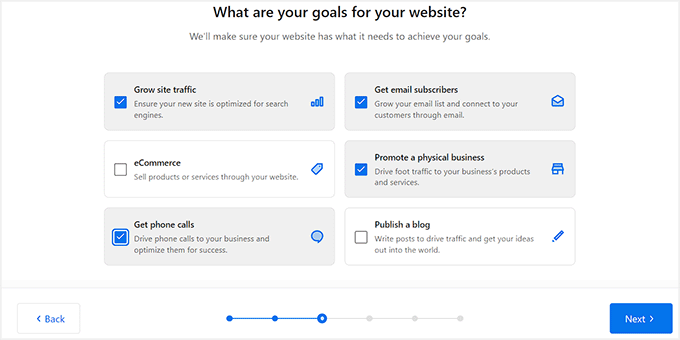
Next, it will display a list of templates tailored to your niche, and you will be asked to pick one.
You can also give a brief description of your website, and the AI will generate some demo website copy accordingly.
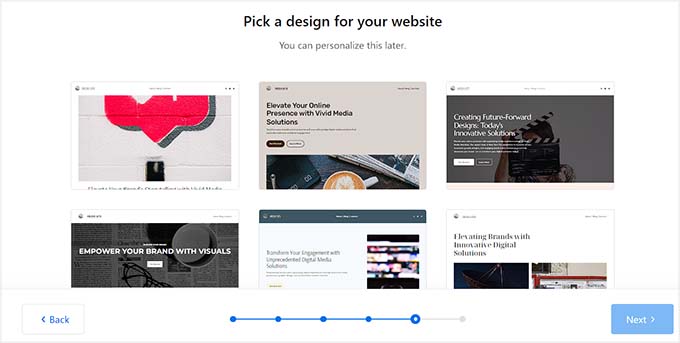
Once that’s finished, your WordPress dashboard will appear.
At this point, you need to visit the ‘Site Assistant’ page.
You can now use the AI website builder to customize your pages, upload a logo, edit the homepage, adjust site descriptions, add navigation menus, and much more.
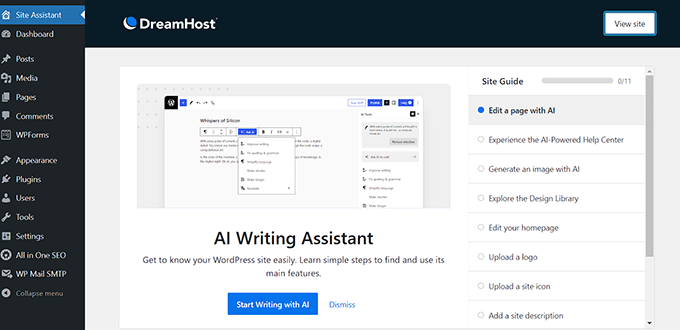
One thing that stood out to me when testing was that you can generate images directly within the WordPress editor and create website copy using AI. You can also select from free stock photos.
The platform offers regular updates and improvements, ensuring your website stays up-to-date with the latest design trends, security patches, and performance optimizations without requiring any manual work.
The Liftoff AI Website Builder even has built-in analytics to help track visitor behavior. I was impressed by the fact that it also includes SEO tools to improve a website’s visibility with AI-driven suggestions for meta tags, keywords, and content.
Overall, this site builder can be used to create any type of website with a custom domain name. Since it’s built on WordPress, it’s easy to add blogging functionality, social media integration, eCommerce features, and more.
Plus, all the premade templates and themes are ready for WooCommerce. This allows you to easily create a storefront using their drag-and-drop website builder (see my list of the best WooCommerce hosting companies).
Cons
DreamHost’s Liftoff AI Website Builder runs on top of WordPress, so you will still need a self-hosted WordPress.org website to use it.
That said, WordPress comes pre-installed with all DreamHost plans. You also get other powerful features included with DreamHost.
DreamHost does not have a free plan, but they offer a 97-day money-back guarantee.
Pricing
The Liftoff AI Website Builder is available as part of all DreamHost plans starting as low as $2.59 per month for one website.
WPBeginner readers also get a free domain, free SSL certificate, and free domain privacy with the Starter DreamHost plan, which also comes with a 97-day money-back guarantee.
This makes DreamHost one of the most affordable website builders on the market.
13. GoDaddy Website Builder

GoDaddy is one of the largest domain name registrars and web hosting service providers in the world. While many business owners use GoDaddy to host WordPress websites, they also offer a simple online website builder for those who don’t want to use WordPress.
Pros
GoDaddy Website Builder is a simple and easy tool to create professional-looking websites. It comes pre-loaded with several ready-to-use blocks that you can drag and drop to build different layouts.
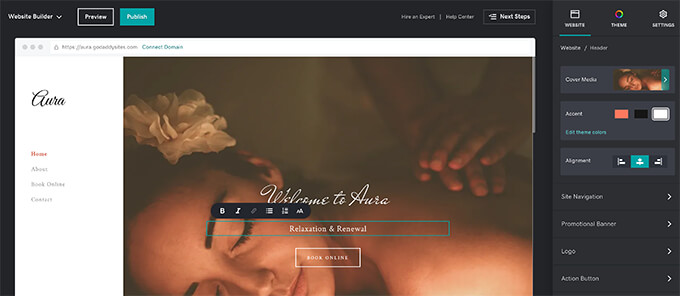
It also has an integrated photo library with professional images from Getty Photography that you can use on your website. You can also upload your own photos and create image galleries.
GoDaddy website builder works on smaller screens too. This allows you to work on your website on the go using your mobile phone or tablet.
Cons
It is not as feature-rich and flexible as most other website builders on this list. It offers a limited set of features with fewer design options.
It is quite difficult to move your website from GoDaddy Website Builder to WordPress.
Pricing
GoDaddy website builder pricing starts at $10.99/month for the Basic plan, $14.99/month for the Premium plan, and $20.99/month for the Commerce plan. All plans are billed annually.
GoDaddy Website Builder can be used for a simple website with a few pages. However, it is not a good choice to build content-rich websites.
Video Guide: Best Website Builders
Here’s a video guide that explains how to choose the best website builder
Conclusion: Which is The Best Website Builder?
WordPress.org is the best website builder. After evaluating all top online website builders, I believe that it outperforms all of them in overall performance, ease of use, price, and flexibility.
WordPress is an excellent choice for beginners, personal blogs, and business websites. Some of the world’s top brands are using it on their websites. See all the reasons to choose WordPress as your website builder.
If you want to build your website with the best website builder, then get started with WordPress by using Bluehost. It is my #1 choice.
You can read my step-by-step guide on how to make a website for detailed instructions.
Looking for business name ideas? Try my AI-powered business name generator tool to find creative brand name ideas.
If you are looking to build an online store (eCommerce website), I recommend WooCommerce as the best eCommerce website builder because it offers all the features that you will need at the best price.
If you want a WordPress alternative, then I recommend using either Wix or HubSpot.
HubSpot offers a free website builder along with a suite of marketing automation and CRM tools to grow your business. It also seamlessly integrates with WordPress should you want to switch later.
Wix offers a free AI powered website builder that’s great for small business websites.
I hope that my website builder reviews help you choose the best website builder for your project. You may also want to see my list of tools to help you grow your website.
Website Builder FAQs
Having helped over 2 million+ users start their websites, I have answered quite a lot of questions. Below are some of the answers to the most frequently asked questions about website builders.
Are website builders worth it?
Yes, overall, website builders are an extremely cost-efficient way to build a website. Instead of paying thousands of dollars to hire a web developer, you can use the easy-to-use drag-and-drop interface that website builders offer to build your own website for a low monthly fee.
Which website builder software do professional web designers use?
These days, even professional web designers use a website builder like WordPress to build their client websites because they can build any type of website using WordPress plugins and themes.
Drag-and-drop WordPress page builders make it easy for professional web designers to create custom websites for clients while saving time, which allows them to serve more clients and make more money each month.
Is it better to code your own website than use a website builder?
In the past, knowing how to code a website from scratch was worth it, but these days, almost all professional developers and designers use a website builder platform or open-source CMS software to build websites.
Website builder platforms have gotten really good, and they simply let you do more in less time. To learn more, see our guide on website builders vs manual coding.
Can I switch my website builder software later?
No, with the exception of WordPress, most website builders make it really hard to switch away from them. This is why it’s extremely important to choose the right website builder that you can grow with.
There are third-party services, tools, and tutorials that can help you switch website builder software with varying degrees of success.
For example, you can use my Weebly to WordPress migrator to switch from Weebly to WordPress.
I also have detailed tutorials on:
- How to switch from WordPress.com to WordPress.org
- How to switch from Blogger to WordPress
- How to switch from Wix to WordPress
- How to move from Squarespace to WordPress
- How to move from GoDaddy website builder to WordPress
- How to move from Joomla to WordPress
- How to move from Medium to WordPress
- How to move from Shopify to WooCommerce
Is WordPress really free? What’s the catch?
Yes, WordPress.org is an open source software that’s 100% free for everyone to use. It’s built by a community of developers under the guidance of the non-profit WordPress foundation.
WordPress is licensed under GPL, which means anyone can use it, modify it, and redistribute it. It gives you full freedom and ownership over your website content.
The only catch is that to use WordPress, you need to have a domain name and web hosting, which is true for all websites.
You can learn more about why WordPress is free and what are the costs.
How can I create my own website for free?
If you want to start a website for free, then you can use HubSpot Website Builder. You can sign up for a free account (no credit card needed).
You can use their smart templates and drag-and-drop editor to create a completely custom web design.
They also offer powerful business tools such as CRM, email marketing, live chat, marketing automation, and more, so you can quickly grow your online presence.
How can I get a free domain name?
The best way to get a free domain name is to choose a website builder platform that offers a free domain as part of their paid plan.
Here are the best website builder platforms that offer a free custom domain:
- WordPress hosted on Bluehost
- Hostinger Website Builder
- DreamHost AI Website Builder
- Web.com website builder
For more details, see my guide on how to register a domain name for free.
Do I need a custom domain to build a website?
No, you do not need a custom domain to build a website, but having one does help boost your credibility.
Often, free website builders will give you a branded subdomain like yoursite.wix.com, but this does not look professional.
This is why I recommend everyone get a custom domain name, especially if you’re serious about your online presence.
Do I need to buy web hosting to build a website?
Yes, all websites need web hosting because that’s where your website files are stored. When you purchase a website builder subscription, you’re technically buying web hosting from them.
As your website grows and gets higher traffic, most website builder platforms will ask you to upgrade your subscription to a higher plan.
See my comparison of the best WordPress hosting companies for more details.
Are there any hidden costs to building a website?
The hidden costs of building any website are addon services such as email marketing services, business phone services, a professional business email address, SEO tools, and other third-party extensions / apps that you may need (varies based on the type of site).
I have written a detailed guide on how much it costs to build a WordPress site (with tips on how to keep it low budget).
Other typical hidden costs in website builders are storage space, bandwidth, domain renewal costs after the first year, higher renewal pricing on some platforms, and aggressive upsell from the sales team.
Which is the best website builder for SEO?
I believe that WordPress is the best website builder for SEO. I use it to build all my websites, and I’m not alone.
Every SEO expert agrees that WordPress is the most SEO-friendly website builder, and this is why over 43% of all websites use WordPress.
Learn how to make a WordPress website (step by step).
Which is the best website builder for eCommerce?
Just about every website builder claims to have eCommerce features, but I believe that WooCommerce (WordPress), BigCommerce, and Shopify are the best website builders for eCommerce.
Which is the best website builder for A/B testing?
You can do A/B testing on just about every website builder. To do this, you’d need third-party tools like OptinMonster, Google Optimize, etc.
Some website builders like WordPress, Shopify, and BigCommerce make it easy to set up A/B testing when compared to others.
What is the best website builder for small businesses?
The best website builders for small businesses are WordPress, Wix, and HubSpot. If you’re looking for an eCommerce website builder for small business, then I recommend using WooCommerce.
Are there any website builders in this list that you would personally avoid?
I typically do not like closed website builder platforms because they lock you in and make it harder to switch. If I had to pick one to avoid, then I’d say avoid Wix because it’s the hardest platform to switch away from. They also aggressively try to upsell every step of the way.
I’ve been building websites since 1998 and have tried many platforms. For the last decade, I have always favored WordPress because it’s open source and gives you full ownership of your content.
What is the best tool to create a website?
The best tool to create your website is WordPress, along with the design tool SeedProd which lets you build your website using a complete drag-and-drop interface (no coding needed). You can use SeedProd to create completely custom WordPress themes and layouts with just point and click.
For a more comprehensive list of design tools, see my comparison of the best web design tools.
Why is WordPress so popular?
WordPress is the most popular website builder, used by over 43%, of all websites because it’s easy to use and flexible enough to make different types of sites. That’s the main reason why WordPress has grown so much in popularity.
For more details, see my complete guide on the most important reasons to use WordPress.
Which are the top 3 best website builders?
My top 3 choices for the best website builder software are:
- WordPress – Best website builder (overall).
- Wix – Best website builder for simple small business websites.
- WooCommerce – Best eCommerce website builder for online stores.
No, this last question is not a joke. I seriously get this question even after referring people to this guide.
What is the best company to use to build a website?
As I mentioned previously, I think the best website builders are WordPress, Wix, and WooCommerce.
However, if you’re searching for a website development company to build a website for you, I recommend WPBeginner Pro Services. It offers custom WordPress web design services at very affordable pricing.
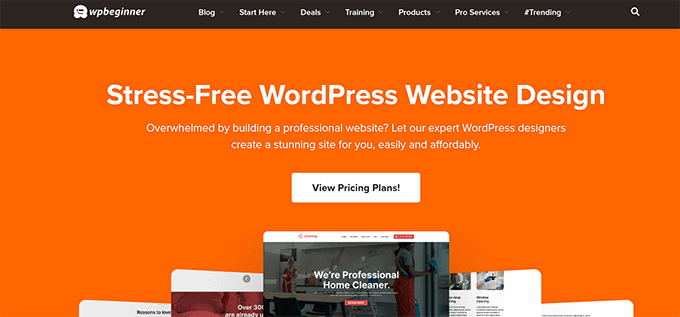
The website design service includes a dedicated project manager, bespoke homepage design, blog setup, SEO optimization, and more. It’s a great solution for people that don’t have the technical skills or the time to create a professional website.
Disclaimer: To help avoid choice paralysis, I only compared the top 13 best website builder platforms. This list doesn’t include other website builder software like Site123, Duda, Jimdo, SiteBuilder, Webflow, Format, Carrd, Ucraft, Google Sites, Webs, IONOS by 1&1, Adobe Muse, Yola, Webnode, etc because I believe the solutions mentioned in this article are simply better.
If you liked this article, then please subscribe to our YouTube Channel for WordPress video tutorials. You can also find us on Twitter and Facebook.





Jiří Vaněk
Thank you for the excellent comparison article. I’m used to using only WordPress and WooCommerce, and I have also used WIX in the past. However, sometimes customer requirements are entirely different from my ideas, and sometimes they don’t want WordPress as the end solution. This is a great guide for me on how to choose and try out another platform that could work similarly to WordPress or WooCommerce for e-commerce. I appreciate the pros and cons for each CMS; it really helps me in my decision-making process.
kzain
I have just tried wix.com and WordPress.org WordPress is a deep ocean you will get as many things as you get. Love this website builder list!
WPBeginner Support
Glad you found our list helpful
Admin
Mrteesurez
The solution you mentioned are not just simple but best.
WordPress still top, it’s flexible, self hosted and customizable to build Amy type of website.
Woocomerce become a popular ecommerce plugin making WordPress brag more.
Peter Iriogbe
Thank you for the insightful post, but I’m a bit confused. You mentioned “WooCommerce” as a website builder. I always thought it was a plugin. Can you clarify if it’s a website builder or just a plugin?
WPBeginner Support
WooCommerce is a WordPress plugin but it does take over WordPress’s tools enough that we considered it a website builder in this sense.
Admin
Indhu Prakash
Hello sir,
You are missing the (Blogger. Com /Blogspot) in this list. My blog is running in this Google CMS..
When you update this post try to add the Blogger in this list…
WPBeginner Support
For the moment we prefer the builders on this list but for our opinion on Blogger we would recommend taking a look at the article below
https://www.wpbeginner.com/opinion/wordpress-vs-blogger-which-one-is-better-pros-and-cons/
Admin
Linda
So for someone who is very tech challenged though experienced in owning and operating websites, which is the best? I have gone thru squarespace and now on shopify but both were built for me so trying to figure out how to make changes and get support is challenging. I also have very specific desires beyond a 2 page place holder website for my e-commerce website that may be beyond my ability to install. I don’t see anything that is ‘super easy’ for a person like me. I’ve shied away from Wordpress because it used to be just for experienced web builders. Has that changed?
WPBeginner Support
It would depend on how specific your design goals are but WordPress can be for beginners and we recommend our content to help simplify the process of the getting started learning curve
Admin
Peter Iriogbe
In addition to what the author said, if you’re not very tech-savvy but experienced in managing websites, the best choice depends on your needs. Squarespace and Shopify are user-friendly, but making changes and getting support can be tricky. If you have specific requirements beyond a basic website and find it challenging to install features, things might be a bit overwhelming.
WordPress has evolved, and there are user-friendly themes and plugins available now. It’s no longer just for experienced web builders. With some dedication to learning, you might find WordPress more flexible for your specific desires, and there’s a broader community for support.
Moinuddin Waheed
Leaving everything aside, the fact that wordpress has a large community support is the single best reason for any one to choose wordpress over other options available.
Other options might be helpful if one is to deal with limited cutomisation options and have very specific needs to go with those solutions but for a braoder range of probelms and needs, wordpress will be best choice to use.
Margaret
Thank you for all these golden nuggets. JUST maybe I can finish my WP site myself.
WPBeginner Support
Glad our recommendations were helpful, we hope this and all of our articles make you that much more confident in using your site
Admin
Muhmmad Rizwan
My First Step with WpBeginner.com Thanks
WPBeginner Support
Glad to see you starting with our content
Admin
Vincent Ermita
Very useful blog post.
WPBeginner Support
Thank you!
Admin